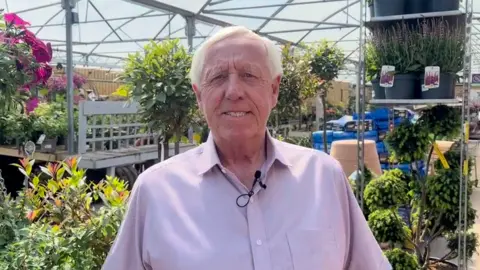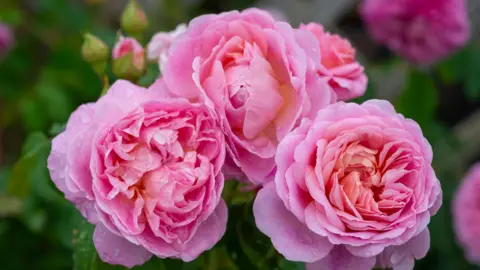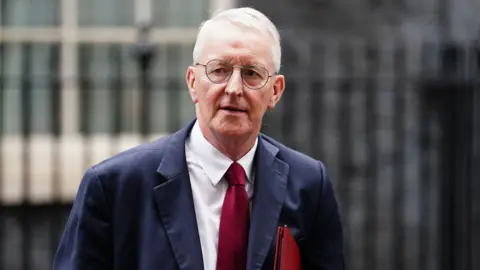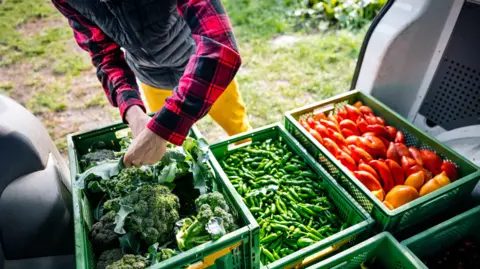New deal reverses ban on some plants grown in GB being sold in NI
 BBC
BBCThe new agri-food deal with the EU will mean the reversal of a ban on some British-grown plants being sold in Northern Ireland.
Some common varieties have been prohibited since 2021 under the terms of Northern Ireland's original Brexit deal.
That deal meant Northern Ireland continued to follow the EU's strict rules on plant health while the rest of the UK had its own rules.
Under the new deal the UK as a whole will realign with EU plant health rules, which will mean the ban can be dropped.
Robin Mercer, from Hillmount Garden Centre in County Down, said the deal was "long overdue" as the current arrangements had driven up costs.
"In the past before Brexit we were bringing in trolley loads of roses every week, now we're having to source them from different places and there isn't the same selection," he said.
"There's a lot of suppliers in England that won't work with us now because it's too much hassle, too much paperwork."
 Getty Images
Getty ImagesCustoms declarations
The deal should also mean GB retailers resume online sales of plants and seeds to Northern Ireland.
However the changes are not yet legally binding and therefore it is unlikely they will be implemented until next year.
In the meantime some requirements which the last government signed up to in 2023 Windsor Framework deal will continue to be implemented.
For example a new phase of "Not for EU" labelling on GB food products being sold in NI will go ahead in July.
That is despite the fact that labelling with ultimately be phased out as a result of the new deal.
Most commercial goods being sold from GB to NI will also continue to require customs declarations, even the products which are covered by Monday's deal.
NI fishing and food supply
 Patsy Farren
Patsy FarrenPatsy Farren is from Donegal Prime Fish, based in Skeoge industrial estate in Londonderry.
He believes Monday's deal could open up new markets for his company and cut down on red tape.
They used to sell smoked salmon to Germany but after Brexit, he said the paperwork made that process too complicated.
"The headache for us after Brexit was that GB suppliers just said they wouldn't be bothered with the paperwork and would no longer supply us," he told BBC Radio Foyle's North West Today programme.
"They just dropped us so we found our own market on the island of Ireland".
 Lynas Foods
Lynas FoodsLynas Foods in Coleraine has 180 suppliers from Great Britain.
Managing director Andrew Lynas hopes the deal will cut down on paperwork and "the big unseen" of costs.
"It's okay moving goods to Scotland at the moment but getting them back is a nightmare," he told BBC Radio Foyle's North West Today programme.
He said they were "cautiously optimistic" that the deal could be a good one.
"But the devil will be in the detail and we think it will be about 18 months before we know that," he said.
 PA Media
PA MediaNorthern Ireland Secretary Hilary Benn said the deal was a "very practical agreement" which has been warmly welcomed across many sectors.
"I think when people judge this they will see it as a good deal that is particularly good for Northern Ireland because it will remove a lot of the paperwork, the checks, the costs and so on," he told BBC News NI's Good Morning Ulster programme.
Benn said the deal meant there would be a "significant easing" of paperwork needed to send some products back and forth, first introduced by the Windsor Framework.
He said this would allow goods to flow more freely between the UK and the EU.
"Let us celebrate what's been achieved because it really is a significant step forward for many, many businesses that are moving goods from Great Britain to Northern Ireland, which is why the welcome has been so positive," he added.
Stuart Anderson, director of public affairs at Northern Ireland Chamber of Commerce, said he remained concerned about the customs burden for movement between GB and NI.
However he said the new deal was "hugely positive news" on the face of it.
He added that businesses in Northern Ireland had "carried a significant amount of the burden in getting us to today".
What's in the new UK/EU deal?
 Getty Images
Getty ImagesThe "landmark deal" agreed on Monday was an attempt by the Labour government to reset relations between UK and the EU.
The wide-ranging agreement includes:
- an agri-food deal which means the vast majority of routine border checks on animal and plant shipments to and from the EU will be dropped
- the agri-food deal will also reduce the impact of the trade border in the Irish Sea, because the whole of the UK will abide by EU agri-food export rules.
- a 12-year fishing agreement which gives EU boats continued access to UK waters until 2038, which is an extension of the current rules.
- the establishment of a formal UK-EU defence and security pact in which both sides will share more information and coordinate on sanctions.
- a plan to allow British holidaymakers to use e-gates at more European airports, subject to agreement by individual EU member states.
- a new animal passport system aimed at making it easier for UK pets to travel to the EU and reduce the need for repeat vet certificates
Prime Minister Sir Keir Starmer described it as a "new partnership between an independent Britain and our allies in Europe" but critics accused him of betraying Brexit voters.
The Conservatives said the UK will have to follow EU agri-food rules without having any say in how those rules are made.
